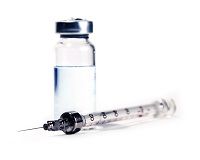Hepatitis C Spread by Alternative Therapy
An alternative treatment for healing injuries is believed to have spread hepatitis C infection among patients in California, the CDC reports.

Injections given as an alternative medical treatment known as "prolotherapy" or "regenerative injection therapy" spread hepatitis C among at least seven patients of 400 who were potentially exposed. All were treated at a clinic in Santa Barbara, CA, the US Centers for Disease Control and Prevention reported.
Investigators said that the clinic was using a single syringe for multiple injections.
The injections, which consist of a variety of substances sometimes including platelet-rich plasma, are meant to treat chronic pain. This therapy is becoming more popular, the CDC said.
The incident came to light in November 2014 after a California blood bank reported to the Santa Barbara County Public Health Department that blood from a frequent donor showed a previously undiagnosed acute hepatitis C virus (HCV) infection.
The donor had no known risk factors such as intravenous drug use so authorities investigated.
The California Department of Public Health and the CDC determined that the donor was getting injections at a pain clinic and that its workers had poor infection control practices.
They shut down the clinic when they found that infection control had not improved by a second visit,.
Reporting in the current issue of Morbidity and Mortality Weekly Review, the authors said these poor practices may also have exposed all 400 clinic patients to hepatitis B virus and HIV.
The lesson to be learned is that “Identification of a case of acute HCV infection in a frequent blood donor without other risk factors should be considered a sentinel event” wrote Monique A. Foster, MD for colleagues in “Investigation of Hepatitis C Virus Transmission Associated with Injection Therapy for Chonic Pain- California, 2015."
They also suggested that while hospital workers are usually adequately educated on infection control, "all health-care settings, including complementary medical settings where injections occur, should follow guidelines for safe injection practices."
Foster also noted that there are no formal practice guidelines for administering the therapy, nor is any special training required.